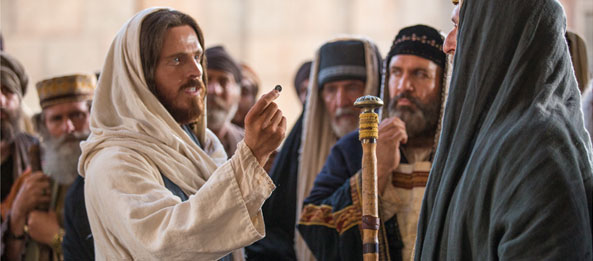Jesus Silences the Religious Leaders
Matthew 22:15-46
“Give to Caesar what is Caesar’s, and to God what is God’s.” With such words Jesus silenced the religious leaders. People were amazed. They asked “How did this man get such learning without having been taught?” Hearing them Jesus answered, “My teaching is not my own. It comes from the one who sent me” (John 7:16). When Jesus told the Jews to give to Caesar what is Caesar’s, some Pharisees and Herodians had come to catch him in his words. They wanted to show him up as a false teacher. The Pharisees considered themselves to be guardians of the law – those who upheld what it was to be Jewish. The Herodians were the pro-Roman Jewish aristocracy who demanded loyalty to Herod and Caesar.
The Pharisees said to Jesus “We know that you are a man of integrity and that you teach the way of God in accordance with the truth. You aren’t swayed by others, because you pay no attention to who they are.” Their flattery was designed to remind Jesus that unlike the Herodians, he wasn’t a man who treated Caesar differently to ordinary men. And from this platform they fired their trap question – “Should we pay taxes to Caesar or not?”
This question placed Jesus in a very difficult position. If he said “No, we shouldn’t pay tax,” he could be accused of trying to raise a rebellion against Rome over tax as another Galilean had done just 25 years before. If he said “Yes, we should pay tax,” he would appear unsympathetic toward his own people who resented paying tax to their conquerors.
But the Father gave Jesus wisdom and boldness for the moment. And he said “You hypocrites, why are you trying to trap me? Show me the coin used for paying the tax.” And one of the Jews fumbled around in their purse and produced a denarius. Holding it up Jesus said “Whose image is this. And who’s inscription?” “Caesar’s” everyone responded.
Now we have to understand that the Jews did not carry this coin just to pay tax, it was a coin used for general buying and selling. In fact the Jews would dodge this tax where possible, so if they had the coin it was for general commerce. Roman money was not the only currency available, but it was the strongest – like Dollars today. Jews used it because it was simply better money. And since they were benefitting from Caesar’s system, Jesus said “Give to Caesar what is Caesar’s.” He was saying, ‘This has Caesar’s image, it belongs to him – so pay him what is due.’
But then Jesus said something far more important: “And give to God what is God’s.” Oh, and what is God’s? Well, where do we find his image? Genesis 1:27 says mankind is made in God’s image, and as God’s chosen people the Jews considered themselves to be better representatives of God than anyone else. But here the Jewish leaders were being deceptive and trying to trap a man who was speaking the truth. So Jesus was saying ‘If you bear God’s image then act as God’s image. He has given you life, so give him was is due.’
Here, Jesus exposed the Jews hypocrisy on two levels – first, they wanted to make him look unsympathetic towards the Jews, but they were the ones carrying Caesar’s coins. And secondly, they were out to make Jesus look like a bad representative of God when in fact they were the ones who were misrepresenting him.
Having failed in their attempt to trap Jesus the Pharisees and Herodians then wandered off. But that same day the Sadducees tried to get Jesus with another question. We won’t go into the details here, but because the Sadducees did not believe in life after death they raised a question that was designed to mock the idea. But Jesus said “Have you not read what God said to you, ‘I am the God of Abraham, the God of Isaac, and the God of Jacob’? He is not the God of the dead but of the living.” Jesus was saying that God who is living does not identify himself with the dead, so Abraham must be alive and enjoying the ever-present God. This time it was the Sadducees were amazed at the words of Jesus.
When the Pharisees heard that Jesus had silenced the Sadducees they returned with an expert – one of their best. And the expert asked Jesus, “Which is the greatest commandment in the Law?”
Wasthis another trick question? Yes, it was. If Jesus claimed that one command was more important it would mean that the others were less important, and Jesus could be criticized for belittling large portions of God’s word. But again the Father was ahead of their tricks.
Jesus said the greatest command is to “Love the Lord your God with all your heart and with all your soul and with all your mind” and the second is like it, to “Love your neighbour as yourself.” He said “All the Law and the Prophets hang on these two commandments.”
This is a brilliant reply because Jesus chose two commands that covered the whole law. Love is the basis of God’s entire law. So Jesus did not slip into the trap of making any part of the law less important. This time he had silenced and expert in the law.
Finally it was Jesus’ turn to ask a question. He asked the Pharisees, “What do you think about the Messiah? Whose son is he?” They said “The son of David.” All Jews knew the scriptures said that! But Jesus said “How is it then that David, speaking by the Spirit, calls him ‘Lord’? For he says ‘The Lord said to my Lord …’ (Psalm 110:1). If David calls him ‘Lord,’ how can he be his son?”
Was Jesus now trying to trap them? No. He was provoking their thinking. He wanted them to see that the Messiah was more than David’s son; he was also God’s Son. Again the Pharisees were silent, and the scripture says ‘From that day on no one dared to ask him any more questions.’
The unschooled carpenter’s son from lowly Nazareth had silenced the ‘professors of religion’? He spoke with the wisdom he heard from heaven. And you and I who have the Spirit of God can also speak as we hear from heaven.
Years later the apostle Paul was speaking about this when he said “Brothers and sisters, think of what you were when you were called. Not many of you were wise by human standards; not many were influential; not many were of noble birth. But God chose the foolish things of the world to shame the wise; God chose the weak things of the world to shame the strong.” (1 Cor 1:26-27). “This is what we speak, not in words taught us by human wisdom but in words taught by the Spirit, explaining spiritual realities with Spirit-taught words” (1 Cor 2:13). Jesus said “When you are brought before synagogues, rulers and authorities, do not worry about how you will defend yourselves or what you will say, for the Holy Spirit will teach you at that time what you should say” (Luke 12:11).
I think it’s important to note that when Jesus silenced the Pharisees he used a lot of scripture. Being led by the Spirit does not mean we don’t need to know our Bibles. In fact the Spirit can use us more powerfully when the scriptures are in us. We should think of our minds as being like tool boxes that can be empty or full. The more we read the Bible the more scripture we will have in our memory. Then when we find ourselves in a tight spot as Jesus did, the Spirit can remind us of scriptures we have read. It’s like he goes into our toolbox and says ‘Hey, use this,’ or ‘Say that!’
Like Jesus, you don’t need a university degree to answer critics, a good knowledge of scripture and an ear for the Spirit will take you a long way.







